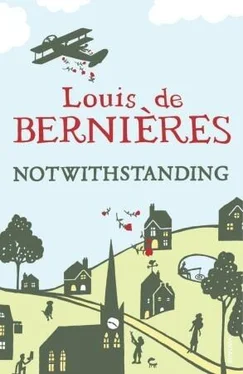She has been listening to the young man with careful attention, and, after he goes, leaving a business card that she secretes in her purse, she sets to work on her father. She is the only child of a wife long gone (run off with someone from the travelling fair on the green, so they say), and in the whole world there is no one but his daughter that Jack Oak loves. She comes over and kneels on the floor in front of him, placing her hands on his knees. ‘Da,’ she says, in a wheedling tone of voice that reminds him of his little girl when that was what she was, ‘Da, two hundred thousand!’
‘I like this place,’ says Jack. ‘This is where I was born, and this is where I’ll die.’
‘But Da, two hundred thousand! We can go west. Somerset, Cornwall. I’ve been there. It’s right nice. We can get a place twice the size and have money over. An’ you don’t work no more, anyway, and I can get a job, I know I can. Two hundred thousand, Da!’
‘I don’t know anyone but ’ere.’
‘But Da, who’s left here?’
‘None to ’ave a drink with,’ agrees her father.
‘It’s all goin’ posh. Just think, Da, we’d be set up for life, both of us. No more worries!’
He looks at her strangely. ‘I ain’t got no worries.’
‘Oh Da, you know what I mean!’
‘Turn the telly on,’ he says. ‘I wanta watch something.’
‘I’ll turn it on if you promise to think about it. Promise?’
‘Course I promise. I was goin’ to think about it anyways.’ He rolls himself a thin cigarette and sniffs it before he lights it. He reckons the sniffing is better than the puffing. He thinks about how some people are trying to stop the little boys from fishing in the village pond, in case someone falls in, and how they don’t let you throw sticks into it for your dog any more in case it frightens the ducks. He spits contemptuously into the fire. The place soon won’t be worth living in, that’s for sure.
So it is that not three months hence Jack and his daughter are completing the melancholy task of dismantling two centuries of settled family life. Into boxes go rabbit snares and mole traps, his father’s pipes, the horseshoe from above the door, glass jars of assorted nails and screws, tobacco tins full of brass washers, a seized-up revolver that his father brought back from the First World War and never handed in, a wooden quiver of African arrows that came back with his grandfather from Tanganyika, tattered Bibles and hymnals, faded photographs and samplers from the walls, and penknives with broken blades. Jessie tries to throw things away, to burn them, saying, ‘But Da, we won’t need this! What do yer want this for, Da?’ and he replies, ‘It’s mine, and I want it, that’s what.’ When she says, ‘But Da, we can get new things now,’ he replies, ‘Ain’t nothing wrong with the old one.’
Jessie has been having terrible misgivings recently. Her father has even tried to dig up every shrub in the garden so that they can be planted at their new place. He has emptied the contents of the compost heap into sacks, has filled more sacks with the best soil from the vegetable patch. Jessie had been hoping to move out with two days’ hire of a man and van, but all this junk and soil and shrubbery is spoiling her plans, and besides, it’s very embarrassing. The man with the van has taken to smirking. Her father has assumed the air of someone resolutely making businesslike preparations in the face of imminent death. He is saying things like ‘Well, it don’t really matter any more. Don’t reckon I’ll be long for the world any road. Reckon you might as well enjoy the money, that’s what I say, ’cause it won’t be much use to me when I’m dead an’ under.’
Out of consideration for her father, Jessie has resisted going for the kind of house she really craves, something clean and new on a smart housing estate, and has found a pleasant cottage for next to nothing in the village of Herodsfoot, near Bodmin. She is sure that he could be happy there. The house is very like the one they are leaving, with a decent-sized vegetable patch and a blue front door. It has one more room, and an inside lavatory, and it doesn’t really need much decorating. She has had to take charge of everything, because Jack’s mind goes into a spin when he has to concentrate on things like deeds and contracts. He signs the documents that she places before him, and says, ‘Might be signin’ my life away, for all I knows.’
On the morning of their leaving Jack hands over the key to the estate agent, and sits in the passenger seat of his Triumph Herald. He looks resolutely forward, at nothing. He is too choked to drive or to speak. He refuses to be unmanned by weeping, and he feels a portion of himself shutting off. Jessie starts the engine and squeezes his hand comfortingly before she puts the car into gear. ‘It’s a sad day, isn’t it, Dad?’ she says, and he does not reply. She has taken lots of photographs of the old house, and plans to frame some of the best ones for the walls of the new one. She combines a sort of pre-emptive nostalgia with a contradictory sense of bright new beginnings. She is optimistic but she feels tears prickling in the corners of her eyes. ‘Goodbye, old home,’ she says, and then starts the car off down Malthouse Lane. They pass the hedging and ditching man, who is examining a freshly excavated workman’s boot. They pass the house where the General used to live, and which is now fitfully occupied at weekends by a couple from London who have already complained about the noise of chickens from over the road, and the crack of shotguns in the Hurst. They want horses banned from parts of the common because they chew up the footpaths, and they want to stop the teenage boys roaring around the tracks on old motorbikes. They want a fence round the village pond so that their child won’t fall in.
‘Goodbye, Notwithstanding,’ calls Jessie, waving to the trees on Busses Common. ‘We still love you. Goodbye, you good old place.’ She wipes her eyes on her sleeve, and drives on.
Two months later Mrs Griffiths is mightily surprised to find Jack Oak standing at his usual post in the village shop, having bought his customary pack of cigarette papers. He hawks up phlegm, and remembers to swallow it.
‘Artnoon,’ says Jack, as usual. ‘Turned out nice again. Looks like rain, though.’
‘Mr Oak!’ cries Mrs Griffiths. ‘Why, I thought I must have seen a ghost! What brings you back to these parts?’
‘Jus’ visitin’,’ says Jack. ‘Jus’ visitin’.’
Mrs Griffiths says, ‘I thought I saw your car outside.’ She has improved in recent months. She has become sociable and talkative, has joined the Conservative Association, and collects money for the RSPCA and the donkey refuge. She has tried going to church but is horrified by how undignified and informal the services have become during her many decades of absenteeism, and so she has given up again. She has finally got round to writing a true-life romance, and it has been published by Mills & Boon under the name of Sophia D’Arcy de Vere. She is bursting with pleasure and pride, but can’t think of anyone she’d dare tell, in case they should read it and come across the steamy scenes.
‘How long are you staying?’ she asks.
‘Back tonight,’ replies Jack. ‘Got nowhere to stay round here no more.’
‘How do you like your new house?’ enquires Mrs Griffiths.
‘It’s all right,’ says Jack, with a shrug.
‘It’s nice, is it?’
‘’S’all right.’
‘Nice people? Have you made friends yet?’
‘Ain’t got round to it,’ says Jack.
‘Nice village?’
‘Nice enough, if you like it.’
Mrs Griffiths tries a new tack. ‘Have you met the people in your old house? They’re terribly nice. Not here much, though. They’ve made some terrific improvements already.’
Читать дальше












